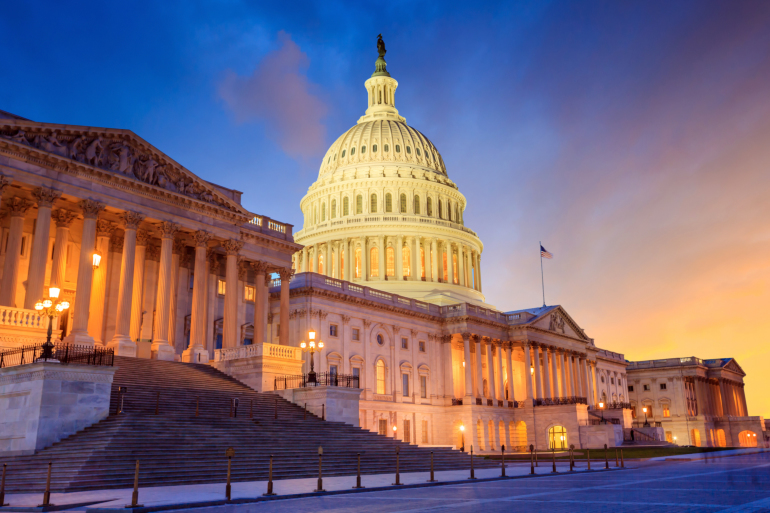Legal Update
Apr 14, 2020
Health CARES - Regulatory Waivers for Long Term Care Facilities
Sign up for our Coronavirus roundup email.
Visit our Coronavirus resource page.
As previously reported, the CARES Act impacts long-term care (LTC) facilities, including skilled nursing facilities (SNFs) and nursing facilities (NFs). In addition to this legislative action, the Centers for Medicare and Medicaid Services (CMS) has implemented several waivers which are intended to provide flexibility in day-to-day operations while allowing for measures to slow the spread of COVID-19.
On April 9, 2020, CMS issued its most recent comprehensive updates to these waivers. The waivers are intended to serve multiple purposes including leveraging telehealth, expanding facility workforce, creating COVID-only care centers, and promoting “patients over paperwork” with the ultimate goal of allowing the health care system as a whole to deal with any patient surges by giving it tools and support to create non-traditional care sites and staff them quickly. The following is a summary of CMS’s LTC facility waivers.
Telehealth. CMS is waiving certain limitations on telehealth reimbursement to encourage providing services remotely.
Physician Services. CMS has waived the requirement at 42 C.F.R. § 483.30 for physicians and physician assistants to perform in person visits and allows such visits to be accomplished using telehealth options. If the LTC facility has telehealth or remote communication capabilities, this waiver will allow it to maintain appropriate physician supervision over care in a manner that expands physician resources and reduces potential spread of the virus while making sure reimbursement is not affected.
Expanding Facility Workforce. CMS has waived certain limitations on delegation of physician services and on qualifications for nurse aides. These actions are designed to assist in potential staffing shortages, maximize the use of medical personnel, and protect the health and safety of residents during the public health emergency (PHE).
Physician Delegation of Tasks in SNFs. CMS has expanded a physician’s ability to delegate tasks in a SNF to appropriately licensed mid-level providers (nurse practitioners, physician assistants, and clinical nurse specialists). Specifically, CMS has partially waived 42 C.F.R. § 483.30(e)(4) which prevents a physician from delegating a task when (a) Medicaid regulations specify that the physician must perform it personally, (b) when the delegation is prohibited under State law or (c) when the delegation is prohibited by the facility’s own policy. The partial waiver gives physicians the ability to delegate tasks even when the applicable Medicaid regulation requires the physician to perform the task personally. The delegated task must continue to be under the supervision of the physician, however. CMS is not waiving § 483.30(e)(4)’s rules against delegation when prohibited by State law or facility policy. Given CMS’s action, State licensing boards and facility governing boards may create their own, similar waivers.
Physician Visits. Likewise, CMS is waiving 42 C.F.R. § 483.30(c)(3)’s requirement that requires physician visits must be made in-person. Under pre-PHE rules, a physician could alternate physician visits with a mid-level provider or otherwise delegate in accordance with State requirements. Under the waiver, any physician visit during the PHE can be delegated to an appropriately qualified mid-level provider.
Limitations. CMS is not waiving the requirements for the frequency of physician visits (42 C.F.R. § 483.30(c)(1)); physician supervision (42 C.F.R. § 483.30(a)(1)); or that the facility provide or arrange for physician services 24 hours a day, in case of an emergency (42 C.F.R § 483.30(d)(3)). These waivers and limitations seek to strike a balance between the need for physician supervision of resident care and the pending (and in some cases current) shortage of health care workers.
Training and Certification of Nurse Aides. CMS is providing LTC facilities flexibility in maintaining their nurse aid workforce with a partial waiver of 42 CFR § 483.35(d). Under pre-PHE rules, SNFs and NFs may not employ anyone for longer than four months unless they meet the training and certification requirements under § 483.35(d). CMS is waiving most of these requirements to assist in potential staffing shortages seen with the COVID-19 pandemic. Nurse aides must still be competent to provide nursing and nursing related services under 42 CFR § 483.35(d)(1)(i), however. In this regard, LTC facilities are still required to ensure that nurse aides are able to demonstrate competency in skills and techniques necessary to care for residents’ needs, as identified through resident assessments, and described in the plan of care under 42 C.F.R. § 483.35(c).
COVID-only Care Centers - “Facilities without Walls.” CMS is providing flexibility for LTC facilities to move COVID patients to another facility while still remaining the provider of record.
Under Arrangements. During the PHE, CMS is allowing LTC facilities to transfer COVID-19 positive residents to another facility (such as a COVID-19 isolation and treatment location) temporarily while continuing to provide services to such residents “under arrangements,” as long as the transfer is not inconsistent with the state emergency preparedness or pandemic plan or directives of the local or state health departments. The transferring facility bills Medicare as the provider and reimburses the receiving facility according to a contract for services. This contract for services should comply with Federal and State fraud and abuse laws, e.g., the Anti-Kickback Statute, 42 U.S.C. § 1320a-7b.
If the transferring facility will not provide services under arrangement, then it should submit a discharge bill to Medicare and the receiving facility bills Medicare. If the receiving facility is not yet an enrolled provider, the facility should enroll through the provider enrollment hotline for the Medicare Administrative Contractor that services their geographic area to establish temporary Medicare billing privileges.
“Patients Over Paperwork.” CMS has relaxed certain reporting, notice and other “paperwork” requirements to allow for mobilization of units and facilities to ensure care and services for treatment of COVID-19 are available while protecting other vulnerable adults. CMS believes this will also free up inpatient care beds at hospitals.
Physical Environment. CMS is waiving the building requirements under 42 C.F.R. § 483.90, including safety and emergency power provisions, to allow the use of a non-SNF building to be temporarily certified and available for use in the isolation process for COVID-19 patients where it is not feasible in the existing building (provided the state has approved the location as one that meets the safety and comfort requirements). In addition, CMS will waive certain conditions of participation and certifications requirements for opening a NF (if the state determines there is an immediate need for a temporary COVID-19 isolation and treatment location) and to allow the use of non-resident rooms (e.g., activity rooms, meeting/conference rooms, and dining rooms) to accommodate beds and residents in emergency situations where additional space is needed as long as residents can be safe, comfortable and other applicable requirements are met.
Although these requirements are being waived to allow for rapid mobilization of care units and spaces, resident safety should not be compromised to a point that outweighs the benefits of the added space.
Resident Transfer and Discharge. CMS is providing partial waivers of 42 C.F.R. §§ 483.10, 483.15 and 483.21 to allow LTC facilities to move residents within a facility and transfer residents to other facilities for the following purposes: (a) for a resident with symptoms of respiratory infection or confirmed diagnosis of COVID-19, transfer to a facility that is dedicated to care for such residents; (b) for a resident who does not have symptoms of respiratory infection or confirmed diagnosis of COVID-19, transfer to a facility that is dedicated to the care of such residents to prevent them from acquiring COVID-19; and (c) for a resident who does not have symptoms of respiratory infection, transfer to a facility that will observe for any signs or symptoms of a respiratory infection over the next 14 days.
Pre-PHE rules require transferring LTC facilities to provide advance notice of treatment and alternatives (§ 483.10(c)(5)); transfers (§ 483.15(c)(3), (4)(ii)); reasons for the transfer (§ 483.15(c)(5)(i)); appeal rights (§ 483.15(c)(5)(iv)); and bed hold policies (§ 483.15(d)) while placing certain limitations on moves within the facility (§ 483.15(c)(9)). Similarly, a receiving LTC facility under standard regulations would be required to develop a baseline care plan (§ 483.21(a)(1)(i)) and comprehensive care plan (§ 483.21(a)(2)(i), (b)(2)(i)) within certain time frames. These requirements would be suspended during the PHE to expedite the isolation of infected residents and monitoring of non-infected residents in a safe environment.
Limitations. These waivers are limited and most resident rights are maintained. Although advance notice of risks and benefits is not required under § 483.10(c), a transferring facility must provide notification of options relating to the transfer under §§ 483.15(c)(3), (c)(4)(ii), and (iv), (c)(9) as soon as practicable. In addition, resident rights to participate in, be fully informed of and request discontinuation of their care and treatment still apply. Also, while care plan timing requirements are relaxed under § 483.21, receiving facilities should complete the required care plans as soon as practicable, based upon care plans from transferring facility.
In addition, the transferring facility must receive confirmation from the receiving facility (in writing or verbal) that the facility will accept the resident. Transferring facilities are also responsible for ensuring that any transfers (either within a facility, or to another facility) are conducted in a safe and orderly manner, and that each resident’s health and safety is protected.
3-Day Prior Hospitalization. CMS is waiving the 3-day prior hospitalization requirement for SNF payment so that eligible Medicare beneficiaries who experience dislocations or are otherwise affected by COVID-19 can receive treatment at a SNF. In addition, CMS is authorizing renewed coverage for SNF services without having to start a new benefit period for certain beneficiaries that have exhausted their SNF benefits.
Resident Assessment. CMS is relaxing the timeframe requirements for Minimum Data Set (MDS) assessments and transmission under 42 C.F.R. § 483.20 and the Pre-Admission Screening and Annual Resident Review (PASARR) requirements for new residents with a mental illness or intellectual disability under 42 C.F.R. § 483.20(k).
Staffing Data Submission. CMS is also waiving 42 C.F.R. § 483.70(q) which requires LTC facilities to collect and submit data on direct care staff, including whether the staff member is an employee, independent contractor or agency, and resident census.
Resident roommates and grouping. CMS is waiving compliance with certain resident rights to share a room with their roommate of choice, to receive notice and rationale for changing a room, and to refuse a transfer to another room in the facility under 42 CFR §§ 483.10(e)(5), (6), and (7). The waivers are solely for the purposes of grouping or cohorting residents with respiratory illness symptoms and/or residents with a confirmed diagnosis of COVID-19, and separating them from residents who are asymptomatic or tested negative for COVID-19.
Resident Groups. CMS is also limiting a resident’s right to participate in groups under 42 C.F.R. § 483.10(f)(5) so that the facility can follow recommendations for social distancing and limiting gatherings of people of more than 10 people.
These regulatory waivers are explicitly designed to assist LTC facilities and the health care system in general in dealing with surges of COVID-19 patients. As surges are occurring in New York, Washington state, Louisiana and other areas, it will be imperative to track which measures were effective and which were not as facilities across the country brace for coming surges. It is also reasonable to expect CMS to monitor such effectiveness and further modify, pare back, or add to these waivers to address these future surges.
Seyfarth Shaw LLP provides this information as a service to clients and other friends for educational purposes only. It should not be construed or relied on as legal advice or to create a lawyer-client relationship. Readers should not act upon this information without seeking advice from their professional advisers.



